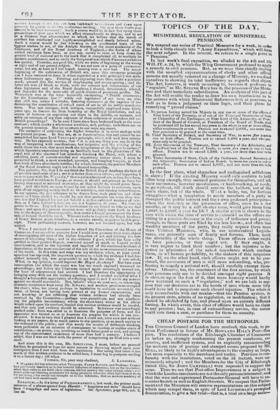TOPICS OF THE DAY.
MINISTERIAL REGULATION OF MINISTERIAL PENSIONS.
Ws suspend our series of Practical Measures for a week, in order to look a little closely into " Army Expenditure," which will form the next subject. In the interim, we return to a single point in us Pensions."
In last week's final exposition, we alluded to the 4th and 3th Will. IV. c. 24, by which the Whig Government professed to apply a remedy to civil pensions. But, as we were then chiefly dealing with the so-called superannuations of clerks and other official persons not usually removed on a change of Ministry, we confined ourselves to showing its total inefficiency as regards that object The Act, however, is worth recurring to, because it professes to " regulate," as Mr. SontNG RICE has it, the pensions of the Minis- ters and their immediate subordinates. An analysis of this part of the Act will enable the reader to draw his own conclusions as to the animus with which Ministerial Reformers look at pensions,. as well as to form ajudgment on their logic, and their plans for remedying " proved abuses.'
I. No person having served his Majesty in any one or more of the offices of First Lord of the Treasury, or of one of the Principal Secretaries of State or Chancellor of the Exchequer, or First Lord of the Admiralty, or Presi- dent of the Board of Control, or President of the Board of Trede, shall he pensioned till lie has served two years in the whole in one or more officer, either continuously or not. Pension not to exceed 2,4)001., nor more than four pensions to be granted at the same time. II. Chief Secretary of Ireland, and Secretary of War, to serve five yearlia one or both offices. Pension not to exceed 1,4001 a year, and two pee. sions only to be granted. III. Joint Secretaries of the Treasury, First Secretary of the Admiralty, and Vice-President of the Board of Trade, to serve ,Dire y aaaa in one or both offices. Pension not to exceed 1,2001. a year, nor more than four to be granted. IV. Under Secretaries of State, Clerk of the Ordnence, Second Secretary of the Admiralty, Secretaries of Indian Board, to serve ten years in one or each office. Pension not to exceed 1,000!., and not more than six tribe greeted.
In the first place, what shameless and undisguised selfishness is shown ! If' the existing Ministry could only contrive to bold office long enough, they secured pensions fur themselves, and left their successors, however meritorious, or hard-working, or needy, to go without, till death should remove the holders, not of the lion's share, but of the whole. What a bribe, too, for factious struggles—what a temptation to needy members of a party to disregard the public interest and their own professed principles— when the reteution or the possession of office, even for a few months, or it may be a still shorter term, would give them from 1,000!. to 2,0001. a year for life I A similar spirit is shown in the care with which the time of service is extended as the offices en- titling to a pension, decrease in the scale of influence and power; though, as these posts are filled by the less known, and often less wealthy members of the party, they really require them more than Cabinet Ministers, who, in our aristocratical Legisla- tures, are generally men of family and fortune. Then, mark the absurdity of the whole thing. These officers either ought
to have pensions, or they ought not. If they ought, it is very unjust to limit their number ; but the injustice is for- gotten in admiration of the naked impudence which confines them, in al human probability, to the makers of this iniquitous law. If, on the other hand, such officers ought not to be pen- sioned, the assurance of men is still more astounding, who, pro- fessing to remedy a national evil, should carefully exempt them- selves. Observe, too, the enactment of the first section, by which four pensions only are to be divided amongst eight persons It is obvious upcn the face of it, that mere knavery would hardly have ventured on such a " regulation ;" and we are loth to sup- pose that our destinies are in the hands of men whom mere folly could have led to perpetrate such absurd injustice. The whole is only reconcileable with our maxim—that the Pension system, in its present state, admits of no regulation, or modification; that it should be abolished by law, and placed upon an entirely different footing. In which event, this class of officers would have no claim to any pension ; but, in ease of extraordinary service, the nation could vote them a sum, or purchase for them an annuity.


























 Previous page
Previous page